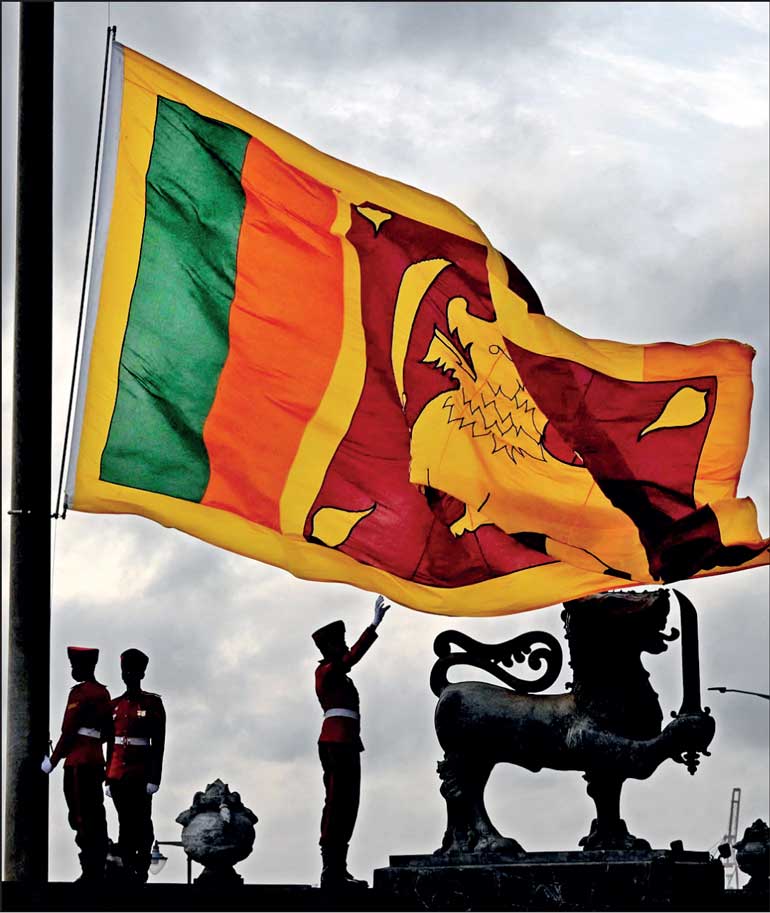Monday Feb 16, 2026
Monday Feb 16, 2026
Friday, 3 February 2023 00:25 - - {{hitsCtrl.values.hits}}

|
 By 04 February 2023 it will be 75 years since Sri Lanka has gained independence. It is relatively a short period of time, not a very long period compared to the lifespan of a country. But, Sri Lanka is currently in a state of great collapse, failure and bankruptcy so far as its socio-political system and economy is concerned. At the time when Sri Lanka gained independence, in terms of development, it remained second only to Japan among the Asian countries. However, it failed to sustain the progress it had achieved prior to independence; after independence in 1948 and up to the 75th anniversary of independence, the socio-political system and economy of Sri Lanka have suffered a major crisis, plunging the country into a level of a failed state followed by bankruptcy. Why did Sri Lanka end up in such a pathetic state? Is there a way out for Sri Lanka to recover from this situation? These two questions can be considered as two major issues that Sri Lanka should seriously address on this occasion in which the 75th anniversary of independence is being celebrated.
By 04 February 2023 it will be 75 years since Sri Lanka has gained independence. It is relatively a short period of time, not a very long period compared to the lifespan of a country. But, Sri Lanka is currently in a state of great collapse, failure and bankruptcy so far as its socio-political system and economy is concerned. At the time when Sri Lanka gained independence, in terms of development, it remained second only to Japan among the Asian countries. However, it failed to sustain the progress it had achieved prior to independence; after independence in 1948 and up to the 75th anniversary of independence, the socio-political system and economy of Sri Lanka have suffered a major crisis, plunging the country into a level of a failed state followed by bankruptcy. Why did Sri Lanka end up in such a pathetic state? Is there a way out for Sri Lanka to recover from this situation? These two questions can be considered as two major issues that Sri Lanka should seriously address on this occasion in which the 75th anniversary of independence is being celebrated.
Importance of having a strong collective effort
Both Sri Lanka and India, our closest neighbour and a very large country in size compared to Sri Lanka, gained independence approximately at the same period. India gained independence on 15 August 1947 while Sri Lanka gained independence on 4 February of the following year. The time difference was 5 months and 20 days only. Looking at the progress achieved at the time of independence, India remained at a much lower level compared to Sri Lanka. But on the occasion of the 75th anniversary of independence, unlike Sri Lanka, India was in a strong and progressive stage at which it was moving forward with a great sense of pride. The fact that India being a country that has gained independence through an arduous and strong collective social effort and Sri Lanka being a country that has gained independence, more or less as a gift in the absence of such a powerful collective effort, could be considered as the most important factor that has caused India's success and Sri Lanka's failure. India was compelled to build a common national vision to make the people actively involved in a collective social effort which was a difficult task. In doing so, it became indispensable to mitigate the ethnic, caste, and religious differences and lay a strong foundation for national integration by adopting a policy that would ensure equal human dignity and equal rights to everyone without discrimination. The leaders who appeared for liberating India from British rule had to make the people aware of both the good and bad of the past civilization and the colonial system, and explain how they envisage building India after it is liberated from British rule.
Success of India
Many positive things that contributed to the upliftment of Indian society took place in the context of the effort made by the leaders of the Indian independence struggle to develop a common national vision acceptable to the people, which eventually fostered the national integration and strengthened the program launched for educating the people about the said vision and making them active participants in the non-violent freedom struggle. This process led to the emergence of mature leaders with democratic discipline who came under the test of the public from time to time and also to develop a society endowed with pluralistic and democratic attitudes and free of ethnic, religious or caste discrimination. Although it was not possible to prevent the division of the country into two as India and Pakistan, India was able to create a situation in which a large number of Muslims who remained in India, which was much more than the population of Muslims moved to Pakistan, could live comfortably and safely in India. Being able to adopt a modern Constitution conducive to realising the cherished dreams of the freedom struggle can be considered as the biggest challenge that India has overcome following the independence that it gained through numerous conflicts. India was able to overcome that challenge very competently and creatively. As a result, today, India has become the largest democracy in the world. An election held at the national level in India is comparable to the aggregate of an election held in the United States of America, Canada, and the whole of Europe, Australia and New Zealand. The Election Commission of India is one of the world's most acclaimed election commissions. Also, the Indian Constitution could be considered as one that has earned great respect. The formulators of the Indian Constitution have entrusted the responsibility of safeguarding and carrying forward the achievements of social revolution gained through the freedom struggle, to the Supreme Court. The Supreme Court of India performs this responsibility entrusted to it so well that it maintains a strict policy that would not allow making laws that weakens or distorts the spirit of the Constitution. Despite limitations, it is by the independent struggle that India has gained the dynamic power to steer the country from its position of a regional power to that of a world power while preserving its pluralist and democratic base.
|
Failure of Sri Lanka
Unlike India, Sri Lanka gained independence not as a result of a strong collective social effort, but through the display of obedience and loyalty to the British rulers through peaceful methods such as appeals, public meetings, presentation of proposals and conducting interviews. It was a peaceful transfer of power. In addition to all that, cunning devices too, have played an important role in the pursuit of independence. Even things like protest marches, strikes and mass agitations, let alone militant action, were considered as things that should not be adopted at all. Those who are interested in gaining an insight into the crafty methods adopted in this connection should read what Sir Oliver Gunathilaka, one of the chief advisors of the then Prime Minister D.S. Senanayake, has said about independence. Also, it is interesting to read what Neville Jayaweera has written about the crafty practices adopted based on what he had heard from Sir John Kothalawala.
India had a social background conducive to launching and sustaining a strong anti-British movement, but Sri Lanka did not have such a background. India was important to Britain because of the enormous wealth it possessed. India was one of the countries from which the British procured the wealth needed for its capital formation which was essential for the industrial revolution. On the other hand, the British followed a policy of destroying Indian industries in order to sell industrial goods produced in England to India. The British ruled India in a harsher way than the way they ruled Sri Lanka. Sri Lanka was important to the British not for its wealth but for its geographical location as an island of strategic importance. After the capture of the Kandyan Kingdom, they followed a strict policy mercilessly suppressing the first rebellion that broke out in 1818, but from then on, a soft policy was adopted to rule the country. Although the British followed a policy that supported Christianity, they followed a policy that allowed other religions to grow freely. They developed Sri Lanka to a maximum level possible during their rule. They bequeathed more for Sri Lanka than what they had gained from Sri Lanka. They ruled Sri Lanka the way they ruled a favourite resort of theirs. Therefore, there was no strong opposition against the British in the minds of the people of Sri Lanka but some respect for them. Therefore, unlike in India, there was no easy way or conducive atmosphere in the country for an anti-British struggle. The gain of independence assuming the form of a gift offered by the colonial rulers rather than an outcome of an aggressive collective social struggle deprived Sri Lanka of the opportunity of adopting a common national vision for the country to move forward on a formal and progressive foundation. It also jeopardised the ability to create mature leaders and build a society endowed with a sufficient level of critical thinking. Failure to eliminate differences based on caste, ethnicity and religion and build the nation on principles of equality could be considered as an inevitable outcome of this situation. As a result of all these, “Sri Lanka which gained independence without shedding a single drop of blood", after 30 years of independence became a country shedding blood incessantly on a large scale for nearly 30 years in a row. Even after ending the internal civil war though belatedly, failure to orientate the country for a reform program aimed at building the nation while at the same time recreating the political system and the economy which has reached a level of degeneration, eventually has resulted in Sri Lanka being plunged into a state of bankruptcy and a failed state. The downfall and degeneration that has occurred in the country now is in a situation which is not easy to be reformed or restored.